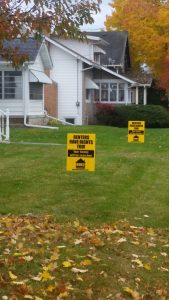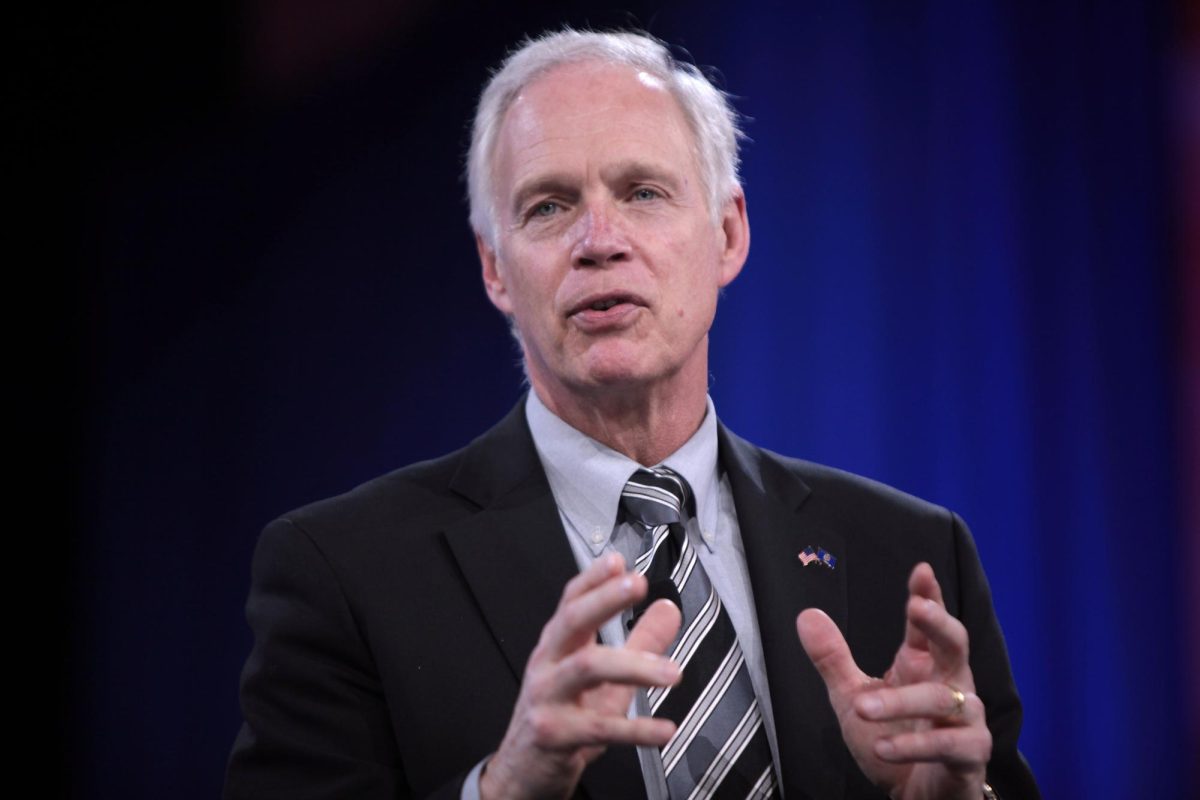
“Safety is incredibly important,” Forsgren said. “I cannot stress that enough, and I think this will help.”
The Oshkosh Residential Rental Inspection Program was passed by the Oshkosh Common Council on Sept. 13 to address concerns about the conditions of rental housing.
Forsgren said this was the third housing bill he had been involved with, and the first two were influenced by landlords more than by the students that would be living in the housing in question.
“It’s better than anything that’s come up in the past,” Forsgren said.
A group has posted signs on off-campus housing around the area that say “RENTERS HAVE RIGHTS TOO” and that “homes will be searched.”
UWO senior Andrew Wagner said he was unsure of how the sign appeared in his front yard.
“I didn’t know what it was about,” Wagner said. “We haven’t had the greatest experience with our landlord, but they hadn’t put anything down before.”
Wagner said he thought the necessity of an ordinance to inspect rental property was worth noting in itself.
According to Donn Lord, president of the Winnebago Apartment Association, the signs were placed as a joint effort between the WAA and the Renters Have Rights Too group out of Colorado.
Lord said he wanted to stress he was speaking for himself, not his association, and his problem with the inspection ordinance was due to its constitutional ramifications.
“If a person doesn’t want to let the inspector in, which is their Fourth Amendment right, the City of Oshkosh still wants to charge an inspection fee,” Lord said. “That’s my main concern.”
According to Lord, city inspectors already do inspections from the sidewalk without charging tenants for their work, something that would change under the new ordinance.
“If you don’t allow them into your home, they’re supposedly going to do what they do from the sidewalk and still charge you a fee,” Lord said. “The problem is they do that now without charging a fee.”
Oshkosh Chief Building Official John Zarate said any fees are billed to the landlords, and are only applicable during an inspection once every five years.
“It is important to note that the fees collected will only pay to cover staff for the program so that city taxpayers don’t have the tax burden to pay for an inspection of someone else’s business,” Zarate said. “Also this fee will be billed to the landlord not the tenant.”
According to Lord, the ordinance is the city’s attempt to reduce spending on inspections.
“The City manager is attempting to make the inspection department self supporting with fees and fines in 2017,” Lord said. “This is the true motivation for the ‘mandatory’ inspection and fees charged.”
The Oshkosh Chamber of Commerce posted a statement in support of the WAA on Oct. 19 that said the ordinance would not move Oshkosh forward.
“The Oshkosh Chamber is encouraging the City to re-establish discussions with the Winnebago Apartment Association in an effort to develop a mutually acceptable program that will truly improve and revitalize inner city neighborhoods,” the statement read, in part. “The inspection component of the city’s program is nothing more than a means to generate revenue for the city to cover its overhead costs associated with this program.”
Zarate said the ordinance has experienced a mixed reaction from different groups.
“Some landlords are very upset,” Zarate said. “Most tenants and the general public are pleased.”
Lord said there are already laws that address inspections from the street.
“Let’s say an inspector pulls up to your home and there’s a bunch of trash on your yard…they can write you a citation from what they see from the street,” Lord said. “You have to understand, they’re charging an inspection fee for an inspection that’s not taking place.”
Forsgren said this legislation was not perfect, but it will be a good thing if it ends up improving the standards for student housing.
“My philosophy on it was if this is really going to improve the quality of housing in Oshkosh, especially student housing, it is a good thing,” Forsgren said. “I say that aware the fees are passed to tenants.”
Forsgren said safety is the primary concern here, and the inspections are worth the cost if they make off-campus housing safer.
“If the inspections go as intended, I think it’ll make for safer housing for students,” Forsgren said. “If that costs a couple extra bucks in rent, it’s well worth it.”
Forsgren said many students won’t be around for inspections because they only happen once every five years.
“It’s going to be an ongoing inspection process,” Forsgren said. “In all honesty, some students will never see an inspector.”
Lord said renters who allow inspectors into their home could end up getting their roommates in trouble if the other tenants did not consent to the inspectors entering the house.
“There is no safeguards, that if you let the inspectors into your house and your roommate has a bag of weed in there, that they won’t call the police,” Lord said.
One student concern Forsgren addressed was the fear of inspectors seeing illegal items like drugs or street signs in their homes during inspections.
“Might that happen?” Forsgren said. “I can’t say that it won’t. But there has to be requisite notice.”
According to Zarate, student tenants should have nothing to fear from the inspections.
“We will only be inspecting for items on the checklist during our inspection,” Zarate said. “Of course if there is something that is reportable that is obviously a crime, such as someone being held hostage, child abuse or child welfare, animal hoarding or abuse, we would have to notify authorities. We will not be involved with informing police about the examples … put out there through social media by landlords.”
Forsgren also said he would encourage students to cooperate with the inspectors despite the cost and other student worries.
Lord said he believes the ordinance should allow voluntary, not mandatory, inspections.
“We are all for quality rental housing, but there are ways to go about it without violating constitutional rights,” Lord said.













